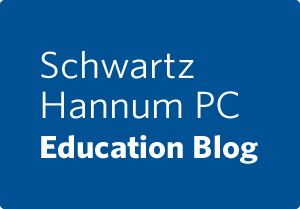By Schwartz Hannum PC
Halloween-inspired tricks may not be the only pre-occupation for independent schools at the end of October. With November 1st fast approaching, schools should review the Massachusetts anti-hazing law to determine if they are required to comply with its distribution and reporting requirements.
Massachusetts legislators have placed the Commonwealth at the forefront of the national movement to mitigate against bullying and hazing in schools. The Massachusetts anti-hazing law (Massachusetts General Laws C. 269, §§ 17-19) broadly defines hazing as “any conduct or method of initiation into any student organization, whether on public or private property, which willfully or recklessly endangers the physical or mental health of any student or other person.” The law requires “institutions of secondary education” to annually distribute a summary of the anti-hazing law to students who are members of any student group or organization (including athletic teams), athletic coaches, and activity sponsors. These recipients must acknowledge, in writing, that they have received notice of the law. Additionally, the secondary school must file a report with the Department of Elementary and Secondary Education (DESE) describing the school’s anti-hazing policies.
While the law is clear on procedure, the anti-hazing regulations do not clearly define a “secondary school.” Only schools deemed “secondary schools” must comply with the distribution and reporting requirements of the anti-hazing law. While schools educating students in grades 9-12 meet the definition of “secondary schools,” DESE often considers K-9 schools to be “secondary schools” even if the majority of students are below traditional “secondary school” age.
We therefore recommend that independent schools educating students in grades 9-12 (even if most of the student body is of lower and middle school age) follow the law’s distribution and reporting requirements. To achieve compliance, we recommend that schools accomplish the distribution requirement in the following manner:
- Include an anti-hazing policy in the student handbook;
- Attach the full text of the anti-hazing law in an appendix to the handbook;
- Use a handbook acknowledgment page indicating receipt of the handbook; and
- Distribute an anti-hazing policy acknowledgment form to all relevant students and staff for signature.
The anti-hazing law further requires that covered schools file an annual report with DESE attesting to the school having distributed the law, obtained acknowledgments that it has done so, and that it has a disciplinary policy in place that addresses hazing. While this report should be filed on or before October 1 of each year, DESE will not notify the Attorney General of any school required to report that failed to do so, until November 1; thus, schools still have time to comply with the law if they have not already done so. Any school unsure of its status under the anti-hazing law or unclear about the reporting requirements should promptly seek advice of counsel.
If you have questions about best practices for complying with the Massachusetts anti-hazing law, please do not hesitate to contact a member of the Firm’s Education Practice Group.


